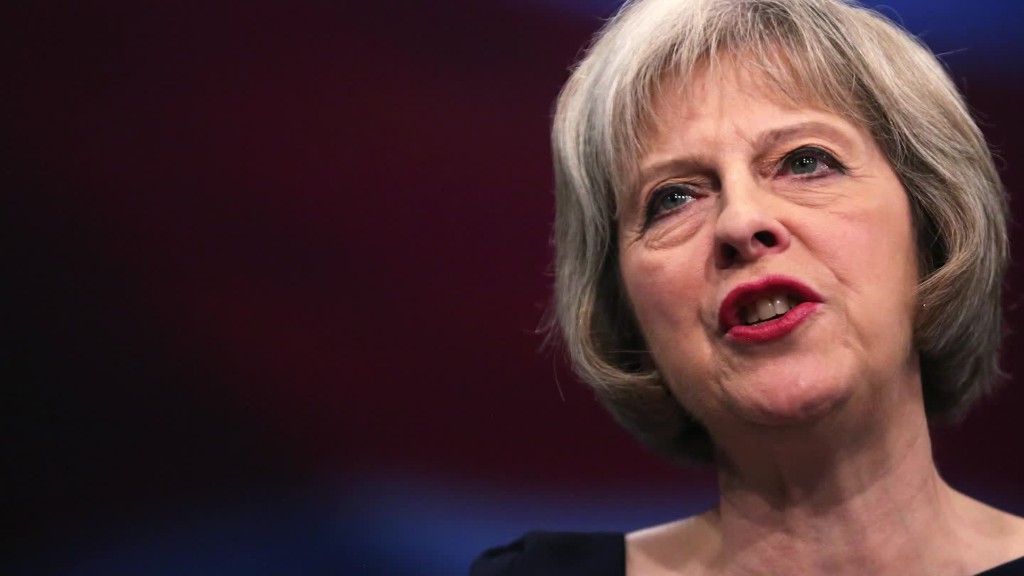
Businesses are worried about the British election. Whoever wins, they're likely to find life harder.
Prime Minister Theresa May called the surprise election for June 8 in the hope of winning a big parliamentary majority to bolster her hand in Brexit negotiations with the European Union that will begin later next month.
May is still on course to win but her Conservative Party has seen its opinion poll lead over the opposition Labour Party narrow in recent weeks.
The increased uncertainty has unsettled financial markets -- the pound was the worst performing major currency last week.
Investors and company executives are still likely to favor May over Labour's socialist leader Jeremy Corbyn, but they have concerns about both parties and their plans for government.
Here are the biggest worries for business:
Theresa May
1. Brexit threat
May says she would rather have "no deal" with the EU on Brexit than a "bad deal," stoking fears that the U.K. could crash out of the EU without an agreement with its biggest trading partner.
"The idea of being able to walk away empty handed might be a negotiating tactic, but it would in reality deliver a risky and expensive blow," said Terry Scuoler, the chief executive of EEF, which represents manufacturing firms.
May has already said she wants to take the U.K. out of Europe's unified market, while negotiating access to it.
No deal, however, could cause chaos by introducing barriers to trade and disrupting complex supply chains.
Some big banks have already started moving jobs out of the U.K. to safeguard their operations across the EU. Under EU rules, they can trade freely across the bloc as long as they have a base in one of the member states.
Airlines say air traffic could be thrown into confusion because they rely on EU agreements. Automakers may have to move some production elsewhere.
Labour leader Corbyn says the U.K. would leave the EU with a deal that "retains the benefits of the single market and customs union" if he were prime minister.
Related: Americans are going to find it much harder to get a job in Britain
2. Fewer migrants
Many voters backed Brexit because they want to reduce immigration. May has promised to cut annual net migration -- the difference between the number of migrants coming to the U.K. and the number of people leaving -- to below 100,000.
That figure stood at 273,000 last year.
But a sharp drop could cause serious problems for crucial sectors of the British economy, including hospitality, healthcare, construction and technology, which employ many migrant workers.
May has also proposed doubling the fee British businesses have to pay for employing foreign workers.
The British Chamber of Commerce said May's approach to immigration would "worry companies of every size, sector, region and nation."
3. Workers rights
May is also promising to take a tougher approach on how companies are managed and top executive pay.
She wants to make executive pay packages subject to binding annual votes by shareholders. Listed companies will also have to publish the ratio of executive pay to broader pay levels in the U.K. workforce.
Under a Conservative government, workers would also be given a voice in the management of their companies, with representatives on the boards of all businesses.
They will either have to nominate a director from the workforce, create a formal employee advisory council or assign responsibility for employee representation to a designated non-executive director.
Related: EU citizens are leaving Brexit Britain
Jeremy Corbyn
1. Higher taxes
The Labour Party has promised to increase taxes on businesses and the rich to fund a huge increase in spending on education and health care.
Labour wants the tax rate paid by corporations to increase to 21%, from 19% at present, and then to 26% by the start of the next decade. It plans to squeeze nearly £20 billion ($26 billion) out of businesses.
Income tax would also go up for anyone earning more than £80,000 ($103,000). A new top 50% rate of tax would be introduced for anyone making over £123,000 ($158,000).
"While Labour are making some specific and targeted propositions that could boost the growth prospects of small and medium-sized firms, these will be largely eclipsed by their proposals for higher personal and business taxes in the eyes of business leaders," said Adam Marshall, Director General of the British Chambers of Commerce.
Related: Britain's Bernie Sanders wants huge tax hike to make college free
2. Government intervention
Corbyn wants to nationalize railways, energy companies and the Royal Mail, bringing those private companies back into state ownership.
"High personal taxation, sweeping nationalization and deep intervention in business decision making are not the hallmarks of an ambitious and enterprising society," Marshall said.
3. A salary cap
Corbyn has proposed capping salaries for top executives working in the public sector and for businesses bidding on government contracts. The cap would be set at 20 times the salary of the lowest paid worker in the company.
That means any public sector organization or contractor employing a full time worker on the minimum wage -- equivalent to £14,382 per year -- could not pay its top executive more than £287,640.
Corbyn has also proposed making unpaid internships illegal and giving more power to labor unions.


